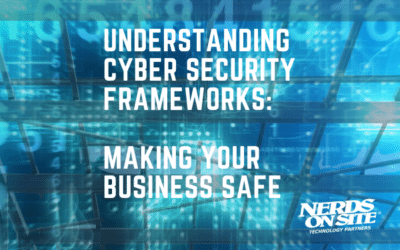Understanding Why Small Businesses Are Targeted for Cyber Attacks
Cyberattacks on small businesses are on the rise. Contrary to common perception, small businesses increasingly find themselves in the crosshairs of cyber criminals. Here’s a brief look into why:
Article Contents
- Cyber criminals perceive small businesses as easy targets.
- Small businesses often lack robust security systems.
- The data held by small businesses can be valuable to hackers.
In this article, we will delve deeper into why small businesses are often targeted and how they can shore up their defenses against these growing threats.
Why Many Small Businesses Often Fall Victim to Cyber Attacks
Despite their best efforts, many small businesses fall victim to cyberattacks due to several reasons:
- Limited resources: Small businesses often don’t have the extensive resources necessary to invest in high-level security measures. This leaves them vulnerable to cyberattacks.
- Lack of awareness: Many small businesses are unaware of the extent and severity of the cyber threats they face, making them an easy target.
- Employee negligence: Employees may inadvertently click on malicious links or download infected files, leading to security breaches.
- Outdated software: Failing to update software regularly can leave systems exposed to attacks.
- Use of public networks: Small businesses often use public networks, which can be insecure and expose their data to hackers.
Understanding these risks is the first step towards developing a robust cybersecurity strategy for your small business.
The Cyber Criminal’s Perspective: Gain Access through Limited Resources
From a cybercriminal’s perspective, attacking small businesses often promises a higher chance of success. Here’s why:
- Budget Constraints: Many small businesses are unable to allocate a large budget for cybersecurity, making them attractive targets for cybercriminals who know that defenses might be weak.
- Unprotected Data: Unlike larger corporations, small businesses might not encrypt their data. This means that once hackers gain access, they have easy access to valuable information.
- Lower Risk: Small businesses might not have the financial means or know-how to pursue legal action against cybercriminals, reducing the risk for these thieves.
- Gateway to Bigger Fish: Small businesses can serve as a stepping stone to larger, more lucrative targets. If a small business is linked with larger corporations, gaining access to the small business’s network could provide a path into the network of the larger corporation.
Understanding the motivations of cybercriminals can help small businesses assess their vulnerabilities and strengthen their defenses accordingly.
Why Business Data is a Prime Target for Cyber Criminals
Business data is like a gold mine for cyber criminals. Here’s why they are after it:
- Valuable Information: Business data often includes sensitive information such as credit card numbers, contact details, and even intellectual property. Cyber criminals can sell or misuse this information for profit.
- Ransom Attacks: Cyber criminals can hold your data hostage and demand a ransom. For many businesses, paying up is often less costly than losing the data.
- Access to Bigger Targets: In some cases, small businesses are targeted not because of their data, but because they may provide a gateway to larger, more lucrative organizations.
- Lower Security Measures: Small businesses often have weaker security systems in place compared to large organizations, making them an easier target.
With the escalating threats, it’s clear that cybersecurity should be a top priority for every small business. Investing in robust security measures and regular employee training can go a long way in safeguarding your digital assets.
A Close Look at the Cyber Threats Small Businesses Face
In this section, we will dissect the types of cyber threats that small businesses are most commonly exposed to. By understanding the nature and impact of these threats, small businesses can better prepare and implement effective strategies to mitigate these risks. From phishing to ransomware attacks, let’s delve into the cyber underworld that might be lurking around the corner.
Common Cyber Attacks Targeting Small Businesses
- Phishing Attacks: One of the most pervasive cyber threats, phishing attacks trick employees into revealing sensitive information by posing as trusted entities via email. It’s simple, yet effective.
- Ransomware Attacks: Ransomware is an insidious type of malware that encrypts a victim’s files. The attacker then demands a ransom from the victim to restore access to the data upon payment.
- Malware Attacks: These are malicious software that infiltrates the computer system without the owner’s informed consent. The term ‘malware’ relates to various forms of harmful software, such as viruses and Trojans.
- SQL Injection: This occurs when an attacker uses malicious code to manipulate the backend database, often with the goal of revealing information that the database is supposed to secure.
- DDoS Attacks: In a Distributed Denial of Service attack, the attacker overwhelms a server with traffic, causing it to crash and become inaccessible to users.
Each of these attacks poses significant threats to small businesses and can lead to substantial financial losses, not to mention potential reputational damage.
Understanding the Cyber Threat Landscape for Small and Medium-Sized Enterprises (SMEs)
The cyber threat landscape for SMEs is complex and constantly evolving. Here are some key points to consider:
- Growing Threats: With the rise of digitalization, the number of cyber threats is growing exponentially. No business, small or large, is immune.
- Targeted Attacks: Cyber criminals are becoming more sophisticated, often specifically targeting SMEs due to their perceived vulnerabilities.
- Internal Threats: At times, the threat can come from within, with disgruntled employees or poor internal security practices leading to breaches.
- Lack of Preparedness: Many SMEs lack the resources or knowledge to implement robust cybersecurity measures, making them an easy target.
- Data Breaches: Data breaches can lead to significant financial loss and damage to an SME’s reputation.
By understanding this landscape, SMEs can better equip themselves to face these threats head-on and protect their digital assets.
How to Improve Cyber Security within Small Businesses
The next section aims to provide practical, actionable steps that small businesses can take to enhance their cybersecurity measures. Given the ever-increasing cyber threats they face, having a robust defense mechanism is no longer optional, but a necessity. From educating employees about potential risks to regular system updates, we’ll explore a myriad of strategies that can significantly reduce the likelihood of a cyberattack. Let’s delve into ways you can fortify your digital fortress.
Deploying Robust Security Measures: Multi-Factor Authentication
One of the most effective ways to enhance security is through multifactor authentication (MFA). MFA requires users to provide two or more verification factors to gain access to a resource such as an application, online account, or a VPN. Here’s why small businesses should consider implementing MFA:
- Enhanced Security: MFA provides an additional layer of security, making it difficult for unauthorized users to gain access.
- Minimize Risk: In the event of a password breach, MFA ensures that your systems are secure because the hacker would need more than just a password to gain access.
- Compliance: Certain industries require MFA for compliance with regulations, helping businesses avoid hefty fines.
- User Convenience: With biometric options like fingerprint and facial recognition, MFA can be user-friendly and quick.
By implementing MFA, small businesses can significantly enhance their security posture and protect their valuable assets.
Employee Training: The First Line of Defense Against Cyber Threats
Employees are often the first line of defense against cyber threats, making consistent and effective training crucial. Here’s what effective employee cybersecurity training should include, with relevant statistics and sources:
- Phishing Awareness: Teach employees how to recognize suspicious emails and emphasize the importance of not clicking on unfamiliar links or downloading attachments from unknown sources. According to KnowBe4’s 2023 Phishing By Industry Benchmarking Report, 33.2% of untrained end users will fail a phishing test before receiving training.
- Password Best Practices: Strong, unique passwords are essential. Encourage the use of password managers and regular password changes. IT Governance found that 82% of data breaches involve a human element, such as phishing and the use of stolen credentials.
- Safe Internet Use: Discourage the use of public Wi-Fi for business matters, and explain the risks associated with visiting unsecured websites. IT Governance also reports that email phishing accounts for 90% of ransomware attacks.
- Reporting Procedures: Ensure employees know how to report suspected cyberattacks or phishing attempts. Effective reporting can significantly reduce the damage caused by cyber incidents.
- Regular Updates: Cyber threats evolve; so should training. Regular updates to training programs are necessary to address new threats. KnowBe4’s report also indicates that organizations improved their susceptibility to phishing attacks by an average of 82% in one year by following recommended training approaches.
Through ongoing training, businesses can fortify their first line of defense, an investment that pays off by protecting your business assets and reputation.
Regular System Maintenance: A Key Element in Cybersecurity Strategy
Regular system maintenance is crucial in any cybersecurity strategy. Here are some steps small businesses should take:
- Patching Vulnerabilities: Software updates frequently include critical patches for security vulnerabilities. Regularly updating systems allows businesses to close security gaps, such as the over 65,000 unique CVEs discovered in 2023, which could otherwise be exploited by hackers. A study found that more than 80% of successful cyberattacks could have been prevented through timely patches and software updates.
- Up-to-date Security Software: Maintaining the latest antivirus and security software versions is essential for protection against new threats. In 2023, more than half of the high-risk vulnerabilities were exploited, with ransomware attacks averaging significant payouts, highlighting the critical need for updated security software.
- Optimal System Performance: Regular maintenance ensures systems operate efficiently and can alert to hardware issues that might pose security risks. The importance of system performance is emphasized by the fact that older Windows server OS versions are 77% more likely to experience attack attempts compared to newer versions, underscoring the need for regular updates and maintenance.
- Data Back-up: In the unfortunate event of a security breach, back-ups play a crucial role in enabling the recovery of vital files. The significance of regular back-ups is even more pronounced considering the evolving complexities of the cybersecurity landscape in 2023.
- Regular Audits: Conducting routine cybersecurity audits helps identify weaknesses and areas for improvement. As reported by Edgescan, the Mean Time to Remediate (MTTR) for Critical Severity vulnerabilities is 65 days, highlighting the importance of regular audits in a comprehensive cybersecurity strategy.
Adopting a proactive approach to system maintenance can significantly reduce the risk of cyber threats, effectively safeguarding your business’s critical data and systems. Regular maintenance is not just a technical necessity; it’s a strategic imperative in today’s digital landscape.
Deploying More Sophisticated Counter-Measures:
To enhance cybersecurity effectively, small businesses need to deploy more sophisticated counter-measures that go beyond the traditional security practices mentioned so far.
These measures focus on a proactive and advanced approach to security, emphasizing zero-trust principles. A notable solution in this realm is SME EDGE, which embodies the zero-trust model by:
- Ensuring Device-to-Destination Security: SME EDGE ensures that devices on the network connect only with known and trusted destinations. This significantly reduces the risk of accessing malicious sites or servers, effectively blocking many avenues of attack including data exfiltration, network surveillance and command & control (C2) connections that cyber criminals rely on.
- Minimizing the Attack Surface: By adopting a deny-by-default stance, SME EDGE dramatically reduces the business network’s attack surface. This approach prevents unauthorized connections, critical in stopping cybercriminals from exploiting common vulnerabilities for phishing attacks, ransomware, and other malicious activities.
- Automatic Quarantine of New Devices: SME EDGE automatically quarantines any new devices attempting to join the network. This precautionary measure allows network administrators to assess new devices for security risks and grant access only when appropriate, ensuring that only secure, verified devices can connect to the network.
Investing in Nerds On Site’s Professional Cybersecurity Services: Your Essential Step towards Resilience.
Did you know that someone in the United States becomes a target of cyber threats every 39 seconds? While taking individual steps to enhance cybersecurity is crucial, opting for Nerds On Site‘s professional cybersecurity service can bring immense value.
Our team of specialists brings a wealth of expertise and experience, offering a comprehensive approach to safeguard your business. Investing in Nerds On Site’s professional cybersecurity services can be a game-changer. Here’s why:
- Expert Knowledge: Our cybersecurity professionals stay ahead of the curve, providing insights and strategies that go beyond basic measures.
- Thorough Risk Assessment: Our experts conduct in-depth risk assessments, identifying potential vulnerabilities that may go unnoticed without professional scrutiny.
- 24/7 Monitoring: Benefit from round-the-clock surveillance, allowing for immediate detection and response to any security breaches.
- Disaster Recovery Planning: In the unfortunate event of a data breach, our professionals help design and implement a robust recovery plan.
- SME Edge — Zero Trust Networking: Our latest addition, the SME Edge, provides an extra layer of security to safeguard your business from cyber threats.
- Cost-Effective: The potential financial losses from a cyberattack can far outweigh the investment in our professional services.
By partnering with Nerds On Site, small businesses can ensure a robust defense against cyber threats, safeguarding their future. Contact us today to take the essential step towards cybersecurity resilience!











